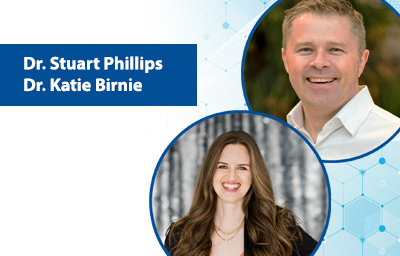Key messages from the IMHA Early-Career Researcher webinar

On May 4, 2022, CIHR-IMHA hosted a webinar for Early-Career Researchers (ECRs) striving for their first CIHR Grant. CIHR-IMHA Institute Advisory Board members Dr. Stuart Phillips and Dr. Katie Birnie engaged with three ECRs who have recently received their first CIHR grant: Dr. Lihi Eder, Dr. Sreenath Arekunnath and Dr. Etienne Vachon-Presseau. The investigators shared their insights and offered some personal tips & tricks. A 20-year veteran of strategic research development, Dr. Dawn McArthur, anchored the session with her top 10 grant writing tips. The webinar concluded with a lively Q&A segment.
Highlights from the webinar include:
Preliminary best practices:
- Scrutinize the resources offered by CIHR (funding overview, webinar info sessions, specific calls, deadlines, ResearchNet, etc.).
- Self-assess upon reading the review criteria — Is it the right time to apply? Do you have the capacity to put your best effort forward? Is another funding opportunity better suited to your ideas?
- Ask to review a successful grant proposal from a colleague in the same field.
- Engage in conversations with stakeholders and knowledge-users on the relevance of your proposal.
- Participate in the CIHR reviewer training program or attend a CIHR New Investigator Forum to participate in a mock peer review panel.
- If given the opportunity, review grants for smaller organizations in your field to experience the reviewer's role.
- Take advantage of opportunities to participate in a proposal review irrespective of the role.
- Keep Canadian Common CV (CCV) up to date
- Demonstrate feasibility through preliminary data (e.g. seed grants and/or available data).
Formatting tips:
- Create a strong research question – address what you are trying to achieve, the gaps in knowledge/care that your study aims to fill, how your approach stands out from previous publications and the significance of your topic.
- Be pragmatic with your rationale – build upon your strongest data, evaluate all assumptions, secure the availability of resources and don’t over-propose (i.e., don’t add a study 3 if you only have a rationale and pilot data for two studies).
- Section your proposal to directly address evaluation criteria and peer review instructions.
- Ensure you present your research in a manner that responds to the funders’ criteria. Be persuasive!
- Include sufficient details on the study design and justify the selection of methods.
- Ensure that the key concepts are straightforward and repeated throughout the proposal.
- Use graphics effectively as tools to reduce complexity and enhance retention.
- Ensure your authentic passion for your science comes across seamlessly.
Personal review tips:
- Have your proposal reviewed by a colleague from another field.
- Utilize editing services if available, and if not, organize a group of your peers to create an editing community of practice.
- Check proposal readability by running through it in various ways (e.g. aloud, on paper, digitally).
- Ensure you do not forget any important attachments (e.g., data management plans, Sex and Gender-based training certificates etc.).
- Be prepared to revise and adapt your proposal through several rounds of adjudication. Take review feedback seriously and use it to create your next grant proposal.
Traps:
- Do not treat your grant proposal like a detailed study protocol – ensure your grant is readable by keeping it simple, clear, and positive.
- Leave “white space” in the proposal, do not cram things in. Densely packed proposals become hard to read
- Avoid the temptation of trying to include everything you know.
- Avoid the temptation of choosing complexity for the sake of novelty.
- Many experienced writers (not just academics) separate the editing phase from the creating phase. You don’t need to go from a blank page to perfection in the one draft. Trying to do that blocks creativity for some people.
- Get ideas down on paper first, refine later
- Do not be discouraged if your first, second, or third application is not successful – be resilient!
- Date modified: